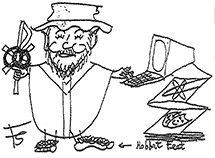Whether or not we believe in God, we have a dawning understanding that the world we live in is on loan to us, and that if we do not treat it with care, we may lose it.
There was an enthusiastic bishop preaching in St James’ Cathedral, saying how when he awoke on a fresh spring morning in the countryside, he jumped out of bed, saying “Jesus! Jesus!” A noted journalist’s wife, sitting in the pew, said to her husband: “Arnold! that’s what you say every morning when you’re late!”
“Jesus!” is probably the expletive of people who are at least marginally cultural Christians. Most people have “God” in their vocabulary, as a word we often utter in despair, anger and more rarely appreciation. The Jewish tradition is never to pronounce the name of God, for the name, if uttered, may summon the Being named! From such fears and lack of other vocabulary have arisen such disguises as “Gosh!” and “Jeeze!”
One of the expressions that reveals either a degree of faith or a degree of fear is ”playing God”. This is often used when criticizing people who make far-reaching decisions which affect daily life. Is it the excuse made by those in Saskatchewan who have rejected Daylight Saving Time? Or the accusation against those who build hydro dams and inundate vast territories belonging to “Nature?” Some parishioners have been upset from time to time when rectors or wardens decide to remove lawns or cut down handsome trees. What would God do? or advise?
Theologically, it is an issue to be faced in matters such as abortion, even contraception, and certainly euthanasia. To take the simpler of the three, contraception: is failing to use contraception really letting “God” decide on babies?
We interfere with “nature” all through our lives, from irrigating fields and building shelters to training horses and producing automobiles or airplanes. The St Lawrence Seaway is “us playing God” in a big way. Do we or don’t we? Play God?
For a Christian believer, who totally accepts that God has come among us and given us freedom to do God-like, creative things in society, art, and science, and in family life, the power to take responsibility for what we are doing. So for example, in a given case, there is a human embryo, a real but incipient human life, and we are going to take that life to further the needs of other forms of human existence? Can we do so conscientiously, because we believe God has given us the power and discernment to make such decisions?
There is certainly much room for argument, but let it be argument from faith.
So also, in our decisions about the earth, there is room for argument about specific measures to “act like God;” in decisions about fuel and carbon, heating and transportation - but there may not be time to argue about “playing God.” The world is on loan to us - lent to us. We are the stewards whether we keep the season called “Lent” as people of faith, or simply people of conscience: let us spend such a time, when in the northern hemisphere the angle of the sun ”leans” more and more upright, conscientiously doing something to decrease our pillage of nature, and to increase our honest dealing with the creation. For example, we may let our style of living and our consuming become leaner in the interests of other people, our mother Earth, and our own physical health.
If in Jesus God united with humanity “by taking Manhood (Humanity) into God” (Athanasian Creed) then surely we are pro-creators with God, whose “mind” we probe by reason, intuition and by revelations of the natural order: to act responsibly, we must think conscientiously.
REMINDER - Lent 1- Love Gives, Power Takes.
How many watches do we wear on our wrists? Do we subscribe to the Cult of the Luxury Trade, the high end of enterprise forcing the world’s poor and starving into more distress by the pressure of Consumption Economics? Are all those jeweled time-pieces hourly reminders of “time’s winged chariot?” Wearing haute couture, do we try to distance the shroud? Let our joy be in giving love: love gives, power takes.

